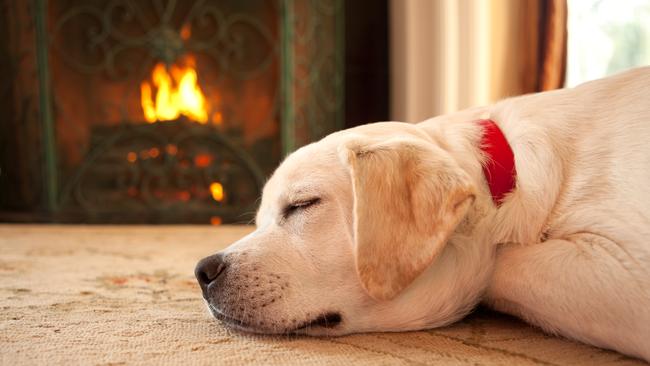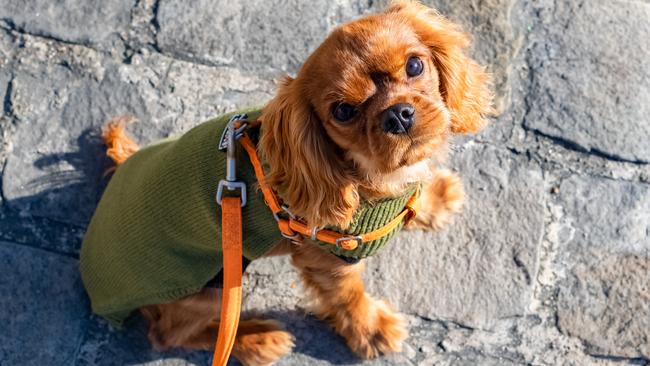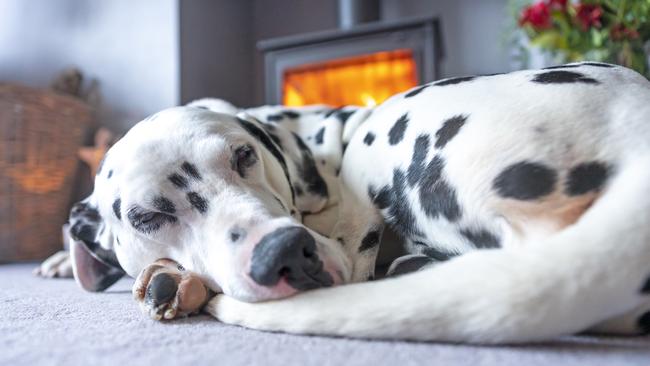RSPCA warns your winter habits can harm or kill your dog
It's a popular trend among fashionistas but it could be doing more harm than good. See expert tips on looking after your dog in winter.
SmartDaily
Don't miss out on the headlines from SmartDaily. Followed categories will be added to My News.
Dog owners who don’t alter the shelter, food and levels of care for their pets in winter risk being among an influx of cruelty reports to the RSPCA at this time of year.
RSPCA inspector team leader Michelle Green says they had 4700 cruelty incidents last winter with common issues being underweight animals, insufficient supply of food and shelter, and lack of veterinary treatment.
DOGS OUT IN THE COLD
Green says many dog owners don’t realise that, while it’s a great time for us to be cosy inside during winter, their pooches “need extra care over the colder months to be kept warm, healthy and happy”.
“One of the things inspectors see a lot in winter is animals not being provided with adequate shelter outdoors so there’s no way to escape the cold, wind, and rain,” she says.
“They need to be protected from those elements and need extra bedding to stay warmer, especially if sleeping outdoors.”
But Green says they receive astonishing reports where owners have a dog shelter but it’s directly on the cold, wet, hard ground.
She says a kennel or bedding needs to be elevated, even if just by 10cm, whether indoors or outdoors.

“When dogs aren’t provided adequate shelter, they can drop body condition because they’re using all their energy to keep warm, especially if they’re not given more food.
“You don’t need to increase a dog’s food by much in winter, just a small increase such as an extra handful,” she says.
While outdoors can be too cold for pets, Green also warns against keeping a dog inside any more than a few hours with heating on at 24 degrees.
WINTER COATS
They also struggle with the winter fashion trend for coats.
Macmillan says dogs run a higher temperature than humans and have a higher metabolism.
“We over-estimate how cold they are and don’t appreciate dogs feel comfort at a different temperature than people,” she says.
“Older dogs with illnesses and short-coated breeds such as whippets and smooth coated chihuahuas may need a coat but most dogs don’t unless they’re in the snow.
“Owners should have a feel for whether their dogs enjoy wearing a coat so if they show the dog a coat and it runs the other way, that’s a good sign that they don’t want it.”

Green says coat wearing can cause health problems for dogs, particularly skin irritations.
“It’s important to remember dogs already have their own coat so to add another layer can cause risks they won’t tolerate,” Green says.
“If you’re going out in the rain, a rain jacket could be good but if it gets too hot, the skin won’t breathe and could become irritated.
“They could also overheat, become dizzy, unsure of their surroundings, and can even start to salivate requiring veterinary attention.
“Heat distress in dogs can be quite severe,” she says.
Similarly, while it’s just as important to maintain grooming during winter to prevent the dog’s coat from matting, over-bathing a dog at any time of year is harmful to their skin.
“Don’t put them outside to dry in winter because they’ll get too cold,” Green says.
IDEAL TIME TO EXERCISE
Winter is the best time of year to exercise your dog, according to PetStock vet Dr Kathy Macmillan.
“There’s no danger of eating grass seed or sunstroke in winter,” Macmillan says.
“Particularly active dogs wanting to do high intensity exercise love this time of year even though their owners are put off. If walking at night, just get a head torch to wear when it’s dark and some high vis gear for you both, and a lead.
“Vigorous activity such as running, long walks and dog sports like fly ball are much better for the dog in winter. They struggle more in warmer weather.”

CARING FOR YOUR POOCH
1. If the weather is too inclement play indoor games such as tug ‘o war and use toys, and food dispensing toys to challenge them physically and mentally.
2. Make sure indoor pets have a warm place to sleep away from drafts and make sure heating
units are safe so they don’t suffer burns.
3. Access to water in cold weather is still important so check outdoor water bowls and provide more than one water source where possible.
4. Keep senior dogs active with gentle daily exercise to keep joints moving and to maintain
muscle mass and strength.
Source: RSPCA




